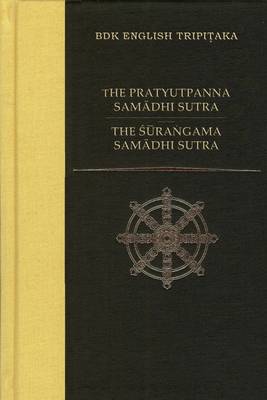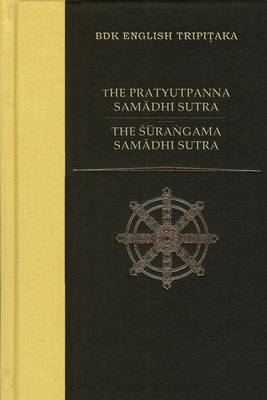
- Retrait gratuit dans votre magasin Club
- 7.000.000 titres dans notre catalogue
- Payer en toute sécurité
- Toujours un magasin près de chez vous
- Retrait gratuit dans votre magasin Club
- 7.000.0000 titres dans notre catalogue
- Payer en toute sécurité
- Toujours un magasin près de chez vous
The Pratyutpanna Samadhi Sutra / The Surangama Samadhi Sutra
53,45 €
+ 106 points
Description
There are two titles in this volume.
The Pratyutpanna Samadhi Sutra is one of the earliest Mahayana sutras and influenced the development of Prajnaparamita, Pure Land, and Yogacara philosophies. It propounds a particular samadhi, or meditation, called the "meditation in which one is brought face to face with the Buddhas of the present" or "the meditation of direct encounter with the Buddhas of the present." This meditation is a developed form of the earlier practice of buddhanusmrti or "calling the Buddha to mind." It also attempts to reconcile the vision of the Buddhas and Buddha-fields of the prsent with the insights of the Perfection of Wisdom school, or the Sunyavada (theory of emptiness) tendency in Mahayana Buddhism. The Surangama Samadhi Sutra expounds the essentials of this meditative practice as the key to attaining Buddhahood. It is written in narrative form, beginning with a grad assembly on Vulture Peak, where the Buddha is surrounded by great numbers of bhiksus, Bodhisattvas, and other beings. The dialogue begins with a question by a Bodhisattva named Resolute Mind, then proceeds involving a number of participants, including Bodhisattvas, Sravakas, gods, and goddesses. It also uses several different supernatural manifestations, such as the simultaneous offering of innumerable elaborate chairs for the Buddha by all the most highly ranked gods present. The grad climax is the Buddha's manifestation of all the innumerable Buddhas of the ten directions. This magnificent epiphany is presented as part of a dramatic hesitation toward the end of the dialogue, when some of the Bodhisattvas in Sakyamuni's assembly become discouraged by the apparent difficulty of the path of Buddhahood being described. Finally, there is the charge to Ananda to preach the Sutra, which is also carried up by one of the many Indra kings who appear in the text. Themes covered in this text include the question of how to account for the apparently dismal spiritual fates of Hinayanist practitioners, the Sravakas, Pratyekabuddhas, and Arhats, the description of innumerable other Buddha lands, the bestowal of the prediction of future Buddhahood and the spiritual identity and fate of women.Spécifications
Parties prenantes
- Traducteur(s):
- Editeur:
Contenu
- Nombre de pages :
- 210
- Langue:
- Anglais
- Collection :
- Tome:
- n° 25
Caractéristiques
- EAN:
- 9781886439061
- Date de parution :
- 01-05-06
- Format:
- Livre relié
- Format numérique:
- Genaaid
- Dimensions :
- 164 mm x 237 mm
- Poids :
- 594 g

Les avis
Nous publions uniquement les avis qui respectent les conditions requises. Consultez nos conditions pour les avis.





